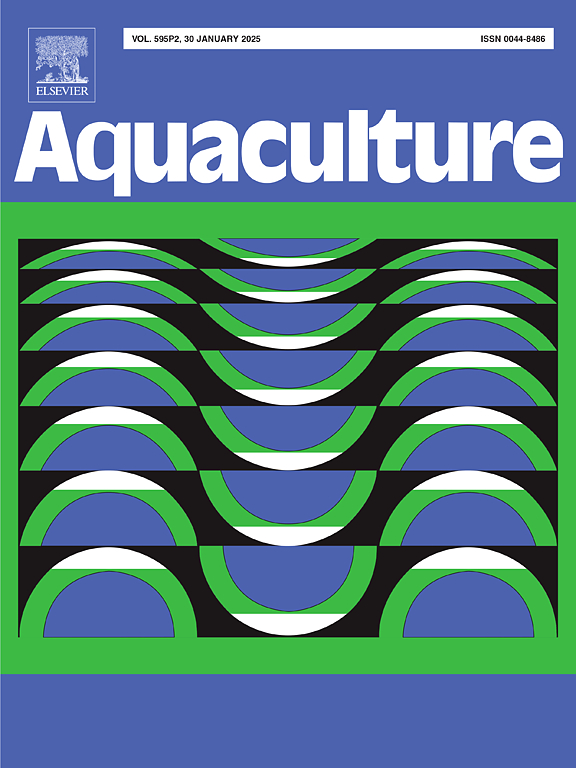Descaling did not affect osmoregulation, growth or mortality in Atlantic salmon smolts after transfer to brackish or sea water
IF 3.9
1区 农林科学
Q1 FISHERIES
引用次数: 0
Abstract
Scale loss is often a result of various mechanical impact such as handling and is assumed to increase the risk of impaired osmoregulation and disease. For this reason, scale loss is a commonly used welfare indicator for farmed fish. Knowledge about the consequences scale loss has for fish welfare under different conditions is however limited, especially the long-term effects. We studied the effect of removal of scales on 0 (control) 5, 10 or 20 % of the scale covered body area on individually tagged Atlantic salmon (Salmo salar, Linnaeus) smolts. Descaling was done at the transfer from freshwater to either brackish (25 ppt) or full-strength seawater (34 ppt) at an optimal temperature (10 °C) that was kept stable during the 6-weeks study period. Fish were sampled for blood and examined for wounds after 1, 7 and 42 days. No fish had wounds at any of the sampling occasions, and no fish in any treatment died during the experimental period. Although all plasma parameters measured (concentration of plasma cortisol, glucose, lactate, Cl−, Na+, K+, and Ca2+) were affected by sampling day and/or salinity, scale loss did not have a significant effect on any of the plasma parameters. Neither did scale loss affect growth. Thus, no negative effects of scale loss on salmon welfare could be documented in the present study. Scale loss may still have negative effects in more challenging conditions, which should be investigated in more detail.
在将大西洋鲑鱼幼崽转移到咸淡水或海水中后,除鳞不会影响渗透调节、生长或死亡率
鱼鳞脱落通常是处理等各种机械影响的结果,并被认为会增加渗透调节功能受损和患病的风险。因此,鳞片脱落是养殖鱼类常用的福利指标。然而,有关鱼鳞脱落在不同条件下对鱼类福利的影响,尤其是长期影响的知识还很有限。我们研究了对单独标记的大西洋鲑(Salmo salar, Linnaeus)幼鱼去除0(对照组)、5%、10%或20%鳞片覆盖面积的影响。从淡水转移到咸水(25 ppt)或全浓度海水(34 ppt)时进行除垢,最佳温度(10 °C)在 6 周研究期间保持稳定。分别在 1 天、7 天和 42 天后对鱼进行血液采样和伤口检查。没有鱼在任何一次采样时出现伤口,也没有任何处理的鱼在实验期间死亡。虽然测量的所有血浆参数(血浆皮质醇、葡萄糖、乳酸盐、Cl-、Na+、K+和Ca2+的浓度)都受到采样日和/或盐度的影响,但鱼鳞脱落对任何血浆参数都没有显著影响。鳞片脱落也不影响生长。因此,在本研究中,鳞片脱落不会对鲑鱼的福利产生负面影响。在更具挑战性的条件下,鳞片脱落可能仍会产生负面影响,对此应进行更详细的调查。
本文章由计算机程序翻译,如有差异,请以英文原文为准。
求助全文
约1分钟内获得全文
求助全文
来源期刊

Aquaculture
农林科学-海洋与淡水生物学
CiteScore
8.60
自引率
17.80%
发文量
1246
审稿时长
56 days
期刊介绍:
Aquaculture is an international journal for the exploration, improvement and management of all freshwater and marine food resources. It publishes novel and innovative research of world-wide interest on farming of aquatic organisms, which includes finfish, mollusks, crustaceans and aquatic plants for human consumption. Research on ornamentals is not a focus of the Journal. Aquaculture only publishes papers with a clear relevance to improving aquaculture practices or a potential application.
 求助内容:
求助内容: 应助结果提醒方式:
应助结果提醒方式:


